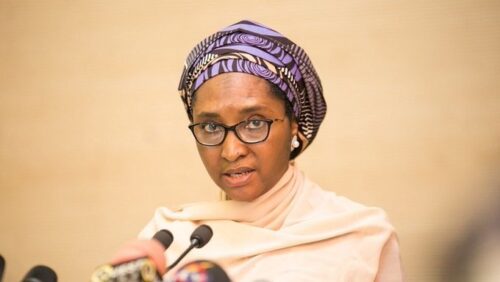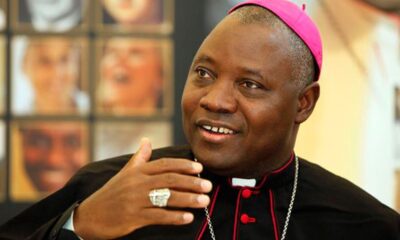The Federal Government, on Monday, said it was developing a comprehensive guide for the incoming administration of Bola Tinubu, on how to manage the removal of subsidy on Premium Motor Spirit, popularly called petrol.
It also insisted that the admin of the outgoing President, Muhammadu Buhari, had done excellently well in the management of fuel subsidy, despite revealing that Nigeria spent over N13tn subsidizing PMS between 2005 and 2021.
A new government to be headed by the President-elect, Bola Tinubu, is to be inaugurated on May 29, 2023.
Speaking at the unveiling of the 2022-2026 Strategic Plan of the Nigeria Extractive Industries Transparency Initiative, in Abuja, the Secretary to the Government of the Federation, Boss Mustapha, said the Federal Government had been following the debates around subsidy removal by citizens.
He said some of the debates include the need to fix Nigeria’s refineries and the creation of visible safety net programs to reduce the impact on the poor and vulnerable in society, especially workers.
“There is also the strong argument on adequate mechanisms to be put in place to ensure that the revenues that will be accruing from the subsidy removal are prudently managed and channeled to the development of key infrastructure and other areas of national development.
“Let me use this opportunity to reassure Nigerians that the Federal Government has followed these conversations with keen interest having borne the burden of fuel subsidy over these years.
“While we remain open to the ongoing debate, a comprehensive position to guide the incoming administration on when and how to make this decision is being developed by the Presidential Transition Council which I currently head,” Mustapha stated.
The SGF, who was represented by a Permanent Secretary from the Office of the Secretary to the Government of the Federation, Maurice Mbaeri, said he had no doubt that the incoming administration would “consider our position on the issue and make an informed decision in the overriding public interest.”
He added, “However, I must state that the Buhari administration has done excellently well in managing the subsidy burden in-spite of the complex challenges it has posed to the economy over these years, putting at the forefront of its considerations, the welfare and needs of the average Nigerian.”
Mustapha said he had carefully studied the NEITI policy advisory on fuel subsidy that was forwarded to his office and commended the agency for the in-depth research and outline of options to assist the government in making a decision on the subsidy removal debate.
“From that policy advisory, over N13tn is documented to have been expended on the payment of subsidy between 2005 – 2021. The figure in relative terms is equivalent to Nigeria’s entire budget for health, education, agriculture, and defence in the last five years, and almost the capital expenditure for 10 years between 2011 2020.
“I guess that this could be more if we compute in financial terms other economic and opportunity costs to the nation. These include the slashing of allocations for the health, education, and technology infrastructure sectors; deterioration of the downstream sector with the declining performance of Nigeria’s refineries, a discentivised private sector investment in the down and mid-stream petroleum sector.
“It also include the low employment generation since the refining process is done outside the shores of Nigeria and inefficient supply arrangements which often leads to scarcity and its attendant queues, etc,” the SGF stated.
On NEITI’s 2022-2026 Strategic Plan, Mustapha explained that under the plan, NEITI would expand its scope of operations to sub-national levels and become more effective in addressing EITI emerging issues.
He outlines the issues to include contract and ownership transparency, gender and environmental reporting, energy transition, while strengthening the agency’s intervention in policy engagements in the oil, gas and mining sectors.
“At this point, I wish to call on all stakeholders to work with NEITI to ensure full implementation of the strategic plan and deliver on all its outcomes for the benefit of our country and the citizens,” he stated.
The Executive Secretary, NEITI, Ogbonnaya Orji, said the plan was set out to achieve three broad strategic objectives for the agency.
“It is to sustain extractive sector reporting and relevance by focusing on national and international priorities; strengthen extractive sector governance and reforms through policy research and strategic stakeholder engagement.
“Thirdly, it is to achieve operational excellence in implementing the agency’s mandate through professionalism, innovation, use of technology and resource management,” Orji stated.
He also stated that NEITI would give more attention to the solid minerals sector, stressing that revenues from that industry had not been encouraging over the years.
IPMAN faults
The National Public Relations Officer, Independent Petroleum Marketers Association of Nigeria, Chief Ukadike Chinedu, said the incoming government must be allowed to first sit with critical stakeholders to discuss how to manage the fuel subsidy regime.
He faulted the move of the outgoing government, stressing that the Buhari regime did not remove subsidy for eight years but was now trying to advise the incoming government on how to remove subsidy.
He said, “For independent marketers, and as critical stakeholders, before such guidelines will be accepted, we need to have a meeting with the incoming government to know the modalities of removing this fuel subsidy.
“However, there is nothing this government that is winding up will do on the issue of subsidy removal. The government is less than 15 days to its winding up. They can offer advice, but they should allow the incoming government to sit down with critical stakeholders and be able to look at the issues around petroleum product subsidy in Nigeria.
“So we wish the outgoing government well and appeal to them to allow the incoming government to deal decisively and critically with the issue of deregulation and subsidy. That is our stand on this matter.”
The Nigeria Labour Congress had earlier told our correspondent that it was looking forward to holding a meeting with the incoming administration over matters relating to the removal of subsidy on petrol.
It, however, insisted that its position on fuel subsidy had not changed, stressing that the government must endeavour to get Nigeria’s refineries functional before taking out subsidy on petrol.
NLC reacts
The Vice President, NLC, Adewale Adeyanju, said though the NLC had already made its position known to the incoming administration, it was looking forward to meeting the President-elect after he has been sworn in as President.
“The man (President-elect) has not been sworn in. When he is sworn in, he can then sit down with the NLC to discuss the fuel subsidy issue. The NLC has been making its position known to Nigerians and to even the incoming government.
“The incoming government has been advised properly by all stakeholders about removing the subsidy and I cannot advise them more on this. But let them come in first and we can then sit with them and discuss this matter,” Adeyanju stated.
Credit: The Punch

 BIG STORY3 days ago
BIG STORY3 days ago
 BIG STORY3 days ago
BIG STORY3 days ago
 BIG STORY3 days ago
BIG STORY3 days ago
 BIG STORY3 days ago
BIG STORY3 days ago
 BIG STORY4 days ago
BIG STORY4 days ago
 BIG STORY4 days ago
BIG STORY4 days ago
 BIG STORY4 days ago
BIG STORY4 days ago
 BIG STORY3 days ago
BIG STORY3 days ago

























